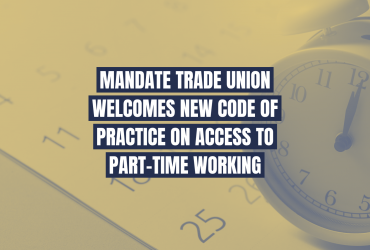Mandate urges immediate implementation of zero hour contract recommendations
Tuesday 3 November 2015Mandate Trade Union, the retail and bar workers’ union, has welcomed today’s report into low and zero hour contracts saying that the recommendations, if implemented, would represent a significant step forward for low paid workers and those working in insecure contacts of employment.
The Union said Dunnes Stores workers in particular should be acknowledged for bringing many of the issues contained in the report into the national spotlight.
“The content of the report proves there is no depths some employers won’t go to in order to avoid their obligations to their workers,” said Gerry Light, Mandate Assistant General Secretary.
“What is referred to as ‘If and When’ contracts shows just how insidious some employers can be. These contracts circumvent legislation that protects workers from zero hour contracts because they give a worker the right to refuse hours. In the real world, workers know that if they refuse hours, at best, they may never be offered them again,” he said.
The key recommendations that could benefit low paid and low hour contract workers includes:
- Employees should be given their terms and conditions of employment on the day or before they begin work
- Contracted hours should reflect the hours a worker is actually doing (a cornerstone of the Decency for Dunnes Workers Campaign).
- A worker who is not given 72 hours’ notice should be paid at 150% of their premium rate.
- Workers who have their shift cancelled with less than 72 hours’ notice should be compensated.
- There should be greater integration between low hour contracts and the social welfare system.
Mandate has called for the immediate implementation of the recommendations and will be writing to all political parties and members of the Oireachtas seeking their support.
However, the Union is also calling on the government to ensure any legislative changes include the ability for low hour workers to seek and avail of more hours if and when they become available. This has been a key demand, not only for Dunnes Stores workers, but for tens of thousands of other vulnerable workers across Ireland.






